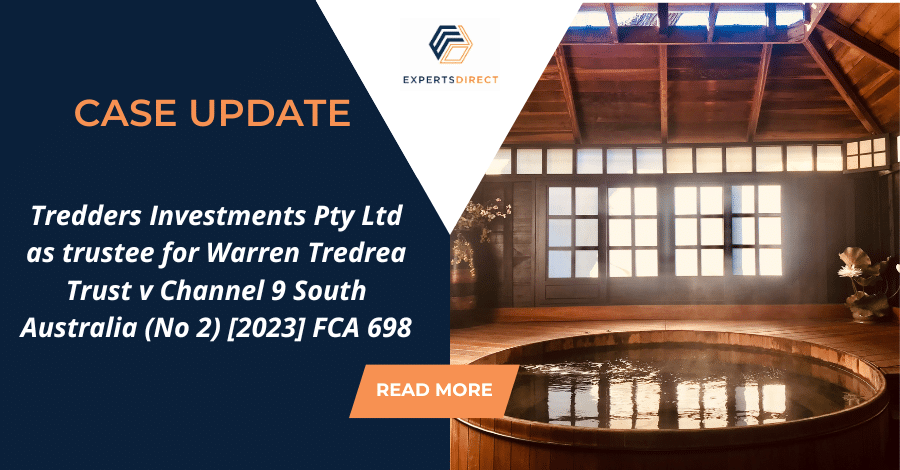Tredders Investments Pty Ltd as trustee for Warren Tredrea Trust v Channel 9 South Australia (No 2) [2023] FCA 698
In this case, the court considered the issue of experts giving evidence concurrently in circumstances where there are significant divergences in the opinions of experts.
Background
The first applicant, Tredders Investments Pty Ltd atf Warren Tredrea Trust, was the company through which the second applicant, Warren Tredrea, provided services to the respondent, Channel 9 South Australia. Mr Tredrea worked as a sports commentator and studio host.
In October 2021, Channel 9 gave a direction that Mr Tredrea would need to provide evidence that he was vaccinated against COVID-19 before he could attend any of its workplaces after 1 December 2021.
Mr Tredrea did not wish to be vaccinated and did not comply with the direction. On 4 January 2022, his service agreement was terminated.
In this proceeding, the applicants sought to establish that the termination of the agreement was not authorised (and was thus a repudiation of the contract), or that it was unfair or harsh within the meaning of the Independent Contractors Act 2006 (Cth). These questions turned, in substance, on whether the direction given by Channel 9 was reasonable.
Expert evidence
The applicant sought to rely on two reports by Prof P, who was asked to answer a series of questions concerning the nature and virulence of various strains of the COVID-19 virus, the efficacy of the available vaccines, and risks associated with them.
The respondent sought to rely on a report by A/Prof G, who was asked six questions concerning prevailing medical opinion in Australia between November 2021 and January 2022. The respondent’s expert was also asked to respond in general terms to a further report of Prof P.
On perusal of A/Prof G’s report, the court noted that he did not confine himself closely to the questions he was asked. His report referred to many studies that were published after January 2022 and expressed views on both the merits of the issues and the state of medical opinion from the point of view of the present day.
The applicant filed an application under r 23.15 of the Federal Court Rules 2011 (Cth) seeking orders for Prof P and A/Prof G to give their oral evidence concurrently.
The court noted that such orders should be made in the way that best promotes the “overarching purpose” of facilitating the just resolution of disputes. [11]
The court also reiterated the benefits of concurrent evidence:
“By giving their oral evidence concurrently, the experts proceed on the same factual assumptions, are effectively asked the same questions, and can respond directly to each other. Genuine dialogue is facilitated and the experts are enabled to provide proper assistance to the court, rather than having their evidence guided or even corralled by cross-examiners.” [12]
However, the parties’ widely divergent approaches to the relevance of the matters canvassed in the experts’ reports complicated the matter. [13]
The respondent submitted that the experts should give their oral evidence sequentially as this would allow it to make forensic decisions as to the extent to which Prof P would be cross-examined. It further submitted that if the experts gave their evidence concurrently, Prof P would be given the opportunity to amplify and add to what he said in his report, and this would:
“… cause prejudice to the respondent, distort the fact finding process, and vastly complicate the task of deciding which aspects of the expert evidence should or should not be taken into account.” [14]
The court observed that, while these concerns could be dealt with by directions limiting the topics on which the evidence is to be given concurrently, each expert would also need to be cross-examined separately, adding the time taken for the experts to give evidence. [15]
Kennett J concluded that, in this case, the pros and cons of concurrent expert evidence could not be properly assessed until it was known what aspects of each of the expert’s reports were to be before the court. [17]
The application for the experts to give their oral evidence concurrently was stood over to a date to be advised.
Key takeaways
- An order for experts to give evidence concurrently should be made in such a way that best promotes the overarching purpose of the just, quick, inexpensive, and efficient resolution of disputes.
- While the benefits of experts giving their evidence concurrently is widely understood, orders requiring the experts to do so are not automatic.
- In some circumstances, it may be appropriate for a court to stand over an application for experts to give their evidence concurrently until the parties reach agreement on the approach to be taken to the matters canvassed in the expert reports.
Read the full decision here.
